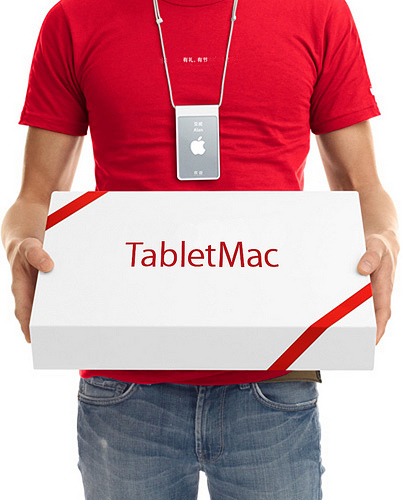 Just when you thought everyone was all talked out about the Apple Tablet, there comes more news. But today’s news is both odd and interesting for a few reasons.
Just when you thought everyone was all talked out about the Apple Tablet, there comes more news. But today’s news is both odd and interesting for a few reasons.
The big news today comes from a Wall Street Journal article which definitively states in the title: Apple to Ship Tablet Device in March. You’d think WSJ would be opposed to using such a title unless they were sure that it is accurate. But early in their own story, the two authors note that “the device’s ship date hasn’t been finalized and could still change.” Still, I guess that’s forgivable if the company’s current plan is to ship in March. Regardless, this would seem to be yet more fuel to the fire that the device is actually real, and is coming soon. But things get a bit stranger as the article goes on.
The article as it appears now has been rewritten from when it first appeared earlier. I know this because I read both versions, and a simple Google search turns up a number of sentences and phrases that are no longer in the story, but are being quoted by multiple other sites and blogs. It’s not uncommon for blogs to write something quickly if there is a breaking story, and then flesh it out and perhaps even alter it a bit later, but again, this is the WSJ, and not their blog — this presumably is an article that will run in the paper tomorrow morning. Still, they had one version, and then changed it.
So what changed? Mostly it has been fleshed out more, but the wording of a few passages have been altered as well. For example, originally the article had this line in it:
Analysts currently believe an Apple tablet will be priced at about $1,000, possibly including a subscription to a nationwide Wi-Fi wireless service.
That line, which originally was featured prominently (high up) in the story, no longer exists. Instead, farther down we get this new wording:
A key factor for the tablet’s success will be price. Yair Reiner, an analyst for Oppenheimer & Co., said in a research note last month that the tablet would be priced at about $1,000, citing sources. One challenge: Apple’s MacBook laptops start at $999.
And below that, we get:
Richard Doherty, director of technology consulting firm Envisioneering Group, said such a price could include a subscription to a nationwide Wi-Fi wireless service such as those run by AT&T Inc. and Verizon Wireless, which provide Internet access at thousands of hot-spots such as airports, hotels and restaurants.
It would seem that the WSJ wanted to make it more clear that it was specific analysts, and not them, suggesting the $1,000 price tag and the nationwide Wi-Fi idea. And that’s understandable since literally dozens of blogs and traditional media outlets are reporting right now that the WSJ is stating the price is “about $1,000” with some also noting the WiFi idea as coming from WSJ. And it’s hard to blame any of these sites, since that’s exactly how I read it originally. And tweets like this, from the main WSJ account, didn’t help:
Exclusive: Apple to unveil a 10- to 11-inch tablet later this month for about $1,000. Shipping in March.
Nor did the one from their community Twitter account:
Word is out – Apple to Ship Tablet Device in March, priced around $1,000
You’ll notice the main WSJ Twitter feed tweeted the story again, presumably after it was altered.
Here’s what I’m wondering about all of this: Is Apple itself behind some of this information?
Of course, there’s no real evidence to prove this, so this is all speculation, but hear me out for a minute. Back in June, you may recall that the WSJ broke the story about Steve Jobs’ liver transplant. The news sent shockwaves around the tech community because Apple had done such a good job of keeping it a secret despite the fact that Jobs had to go live in Tennessee for a few months to get it done. And the timing of that story was suspicious, to say the least. The news broke on June 19, a Friday, at night no less, after the stock market had closed for the weekend (leaving the whole weekend for investors to settle down and realize that Jobs was now okay). It also broke two months after the actual transplant had occurred. Oh, did I mention it also broke on the day of a huge and hugely successful new launch for Apple: The iPhone 3GS? Yep. Curious.
And guess who was the lead author on that article? None other than Yukari Iwatani Kane, the lead author of this latest article as well.
 So, why would Apple leak some information now? Well, there are a few possibilities. First, Google is holding a big event tomorrow that is presumably for its new Nexus One Android device. The device is widely considered to be the best Android phone yet, and brings the platform closer in terms of hardware to Apple’s own iPhone. The rivalry between those two camps continues to grow, and undoubtedly Apple would have no problem stealing some headlines and buzz away from its frenemy.
So, why would Apple leak some information now? Well, there are a few possibilities. First, Google is holding a big event tomorrow that is presumably for its new Nexus One Android device. The device is widely considered to be the best Android phone yet, and brings the platform closer in terms of hardware to Apple’s own iPhone. The rivalry between those two camps continues to grow, and undoubtedly Apple would have no problem stealing some headlines and buzz away from its frenemy.
Second, CES starts this week. Normally, Apple would be attending the Macworld Expo around now and holding a keynote event to unveil some new products which in recent years have almost completely overshadowed CES. This year, Apple will not be participating in Macworld for the first time, and the event has actually been moved to a later date. Apple is also expected to hold its own event later this month (to presumably show off the tablet), but leaking some of this news now continues the tradition of overshadowing what its rivals are doing at CES.
Third, and most importantly, Apple leaking any information about the tablet in the weeks leading up to the event helps to set expectations — and if they’re doing that, they’re meaning to set them realistically, or maybe more likely, low. The amount of hype surrounding the tablet right now is incredible. About the only thing you can compare it to is the hype leading up to the iPhone three years ago. And this may be getting even bigger. If it gets too big, and Apple underwhelms with what is announced, it will obviously look bad for them.
While it’s certainly possible that the WSJ decided “about $1,000” was a good price to quote from analysts, there are at least as many people out there suggesting the device would be more like $600 – $800 — a price that would be much more attractive to consumers. With that in mind, and going along with my little thinking-out-loud-speculation here, I don’t think it’s impossible that Apple could have nudged WSJ towards the $1,000 predictors to temper expectations a bit.
The fact that the wording was odd, and it seemed like the WSJ itself was saying the thing would be “about $1,000” is even better. It’s in people’s minds now that this is how much it will be, and they can ponder that for a few weeks leading up to the event. That way, if the device actually is around that price, people will have been prepared for it when it’s officially announced. It will put the product’s features back into the spotlight, rather than the price, which will have been already known.
Let’s remember, above all, Apple loves its high margins. If this tablet device is really as great as many of us are expecting, it has got to be expensive to build. Apple is not going to sell a device at low margins, they’re just not going to do it. So I certainly would not rule out a $1,000 price tag depending on what it costs to make.
These next few weeks, analysts and pundits will go on and on about how a $1,000 tablet will be a total failure. Of course, they’ve been saying that about iMacs in a time of cheap PCs, MacBooks in a time of cheap netbooks, iPhones in a time of cheap cellphones, etc, for a long time now. Apple has a great track record of defying those rules. Even at $1,000, I would not bet against this device. And if there is any truth to this WiFi subscription service idea (which, again, is a bit odd that WSJ would randomly mention), the thought is that it would be baked into the price of the device — something which Apple would undoubtedly play up. This is similar to how Amazon bakes the cost of wireless service into the Kindle (which has been selling very well despite what many to believe a price tag that is too high).
That said, Kane’s statements in her video follow-up to the article are interesting as well. She notes that “the price could come down really quickly if Apple decided that that’s what they wanted to do.” This is of course what happened with the original iPhone in 2007. Apple launched it at $600 but shaved a few hundred dollars off the price just a few months later to spur sales. And that seems to suggest that Kane, for whatever reason, really believes the device will be around $1,000. Are we really to believe she’s that confident in one analysts’ guesswork?
And there is a flip-side to all of this: Again, going along with my scenario, maybe Apple pointed towards the $1,000 price to set expectations very low in the weeks leading up to the event. That way, if they announce the device at $800, the public will erupt in applause, overjoyed that it’s not $1,000. Classic under promise, over deliver.
This is of course all just speculation, but I’m not so sure it’s that far out there. Certainly, I wouldn’t put any of the scenarios I laid out past Apple, which has a masterful hand when it comes to manipulating the media.
One more thing: A lot of sites are also re-reporting the WSJ saying the tablet will be 10 or 11 inches, with some even saying it could come in both sizes. What they actually said was that it would be 10 to 11 inches. Again, in the video, Kane makes this more clear. That presumably means the tablet will come in one size that is between 10 and 11 inches. Though who knows what they’re talking about with the two different possible finishes. Maybe one aluminum and one plastic, like the various stages of the iPhone and Macs? Hopefully, all of these things will be answered at the end of this month.
[photos: flickr/tombothetominator and myuibe]






























Comment